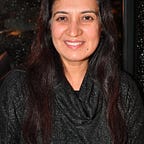To Experience Real Change, Empty Your Cup
Nan-in, a Japanese master during the Meiji era (1868–1912), received a university professor who came to inquire about Zen.
Nan-in served tea. He poured his visitor’s cup full, and then kept on pouring.
The professor watched the overflow until he no longer could restrain himself. “It is overfull. No more will go in!”
“Like this cup,” Nan-in said, “you are full of your own opinions and speculations.
How can I show you Zen unless you first empty your cup?”
This is a simple, effective and applicable story for almost every life situation.
We start new jobs or projects, meet new people, study new subjects, and visit unseen places. But, perhaps, the biggest challenge, for most of us is — to empty our cups, and keep a receptive beginner’s frame of mind, through it all.
We are unfortunately the victims of our past — past experiences, past knowledge, past failures and past victories.
The weight of the past shapes us and prepares us, but also destroys us.
We approach situations with what we know, rather than letting them unfold their own truths and solutions… We wait to give answers even before the questions come up.
Maybe it’s the restless enquiring nature of the mind that reacts rather than observes.
Our biggest folly then is to believe that we know it all… It’s like surrounding ourselves with a fortress wall that prevents the entry of anything new from the outside — a barrier that ultimately restricts learning and growing.
I’ve been a victim of the ‘full cup’ syndrome myself, and would often get the ‘keep an open mind’ comment from friends and family.
There was a ‘know it all’ air that I carried along with me, which perhaps prevented me from seeing things as they were, and gaining greater insight on issues...
Because, the truth is, as renowned author and professor Leo Buscaglia once said, ‘Those who think they know it all have no way of finding out they don’t.’
Thus, the only way to experience something completely different and new is to keep an mind open, by removing all previous traces of knowing, and creating a state of emptiness.
What you know is the familiar. It may have worked in the past, and helped you deal with old situations, but it may not be useful in the present or the future.
Each new moment brings with it its own set of dynamics…and nothing in your past can ever prepare you for it.
Unlearning then becomes an important part of the learning process, and it takes courage… It means facing the harsh truth about yourself, challenging your existing beliefs, and being comfortable with the unknown.
Attaining this state of emptiness and receptivity is not impossible, and can be achieved through practice, discipline, and some quick techniques.
Here are three way to trigger that ‘empty cup’ state within you...
- Adopt the mindset of a beginner
To develop this mindset, try and recall your first day of school, when everything was new — the faces, the space and the subjects taught. Moreover, in school we don’t worry about 10th standard results in the first standard…we allow each level to take its course.
We don’t hasten the pace, we don’t expect to know everything on day one.
When we approach any subject with a blank and unbiased mind, we get ready to experience and absorb anything new it brings. We enter a state of readiness to learn, and we naturally develop more alertness.
2. Get into observation mode
I remember my mother used to say, ‘If you need to learn cooking, you need to stand by me and first observe.’
This is the basis for any new learning — to watch and to imbibe from experts, before you start experimenting by yourself.
Observation is especially important when you’re part of a new workplace or visiting new countries… Each place has its own cultural norms and expectations; hence before you assimilate into it, understand the ethos of the place and then take action.
3. Find comfort in the unknown
The most important disclaimer in all scientific experiments is — ‘Keeping all factors constant.’ But are all factors ever constant in life? There will always be margin for error and uncertainty.
But, if we decide to embrace the uncertainties, and understand that even failure is a stepping stone in the learning process, we may not be that afraid to learn and keep an open mind.
A Zen proverb sums up the idea aptly — ‘Knowledge is learning something every day. Wisdom is letting something go every day.’
And, moving from knowledge to wisdom is the ultimate aim.
So empty your cup, clear away what was, and get ready to experience a new way of thinking and living!
The article was first published on Common Sense Living, a digital publication with new-age lifestyle and wealth-building ideas.
If you liked the post, do applaud, share, or follow me for more!
